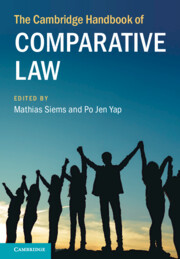Book contents
- The Cambridge Handbook of Comparative Law
- The Cambridge Handbook of Comparative Law
- Copyright page
- Contents
- Figures
- Tables
- Contributors
- Preface
- Abbreviations
- 1 Introduction
- Part I Methods of Comparative Law
- Part II Legal Families and Geographical Comparisons
- Part III Central Themes in Comparative Law
- Part IV Comparative Law beyond the State
- 28 Comparative International Law
- 29 Transnational Regulation
- 30 Quantitative Forms of Legal Governance
- 31 Comparative International Arbitration Law
- 32 Cross-Border Judicial Dialogue
- 33 Comparing Regional Law
- 34 Comparative Conflict of Laws
- 35 Comparative Indigenous Law
- 36 Comparative Legal Education
- Index
29 - Transnational Regulation
from Part IV - Comparative Law beyond the State
Published online by Cambridge University Press: 26 January 2024
- The Cambridge Handbook of Comparative Law
- The Cambridge Handbook of Comparative Law
- Copyright page
- Contents
- Figures
- Tables
- Contributors
- Preface
- Abbreviations
- 1 Introduction
- Part I Methods of Comparative Law
- Part II Legal Families and Geographical Comparisons
- Part III Central Themes in Comparative Law
- Part IV Comparative Law beyond the State
- 28 Comparative International Law
- 29 Transnational Regulation
- 30 Quantitative Forms of Legal Governance
- 31 Comparative International Arbitration Law
- 32 Cross-Border Judicial Dialogue
- 33 Comparing Regional Law
- 34 Comparative Conflict of Laws
- 35 Comparative Indigenous Law
- 36 Comparative Legal Education
- Index
Summary
Particularly in the context of public law, comparative law scholarship typically involves a comparison of legal norms, principles, actors, or legal institutions in different state jurisdictions or across legal traditions. The rise and increasing prevalence of transnational regulators – particularly transnational non-state regulators, but also hybrid and intergovernmental varieties – challenges this methodological default. It invites us to consider the nature of regulation across different legal regimes, some of which might be overlapping, and which, in their claims to authority, might be complementary or conflictual. Acknowledging the presence of transnational regulators within a plurality of legal orders raises questions about how state-centric regulatory institutions at the sub-national, national, regional, or international levels differ from hybrid (state/non-state) and predominantly non-state regimes, whether in terms of their functions (e.g., in terms of standard-setting, enforcement, and dispute resolution) or in terms of their relative claims to authority and political legitimacy. This chapter shows how transnational law poses a conceptual and methodological challenge for comparative lawyers, yet one that reinforces recent innovations in the comparative law field, reflected in this Handbook, that extend comparative law beyond functional comparisons of rules, legal systems, or legal traditions.
Keywords
- Type
- Chapter
- Information
- The Cambridge Handbook of Comparative Law , pp. 575 - 593Publisher: Cambridge University PressPrint publication year: 2024



